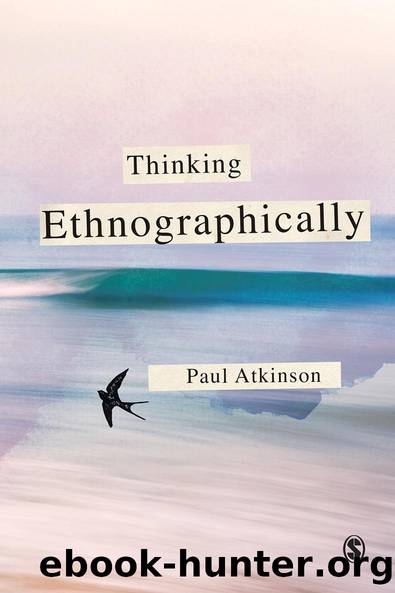Thinking Ethnographically by Paul Atkinson

Author:Paul Atkinson [Atkinson, Paul]
Language: eng
Format: epub
ISBN: 9780857025890
Barnesnoble:
Publisher: SAGE Publications
Published: 2017-09-01T00:00:00+00:00
Conclusion
While I have emphasised that ethnographic research is not just about individuals, and it is not about individual actorsâ âexperiencesâ, that does not mean that we are not interested in the general topic of identity. As I have tried to demonstrate, identities are socially produced, and are locally realised. It is too easy to produce evocative descriptions of social worlds in which social actors themselves are taken for granted. By contrast, our collective interest in the analysis of social worlds ought to include analysis of just how social actors are produced and reproduced. We need to promote a âpeopled ethnographyâ, while recognising that âpeopleâ are thoroughly social.
I have stressed a number of well-worn analytic themes here. As I acknowledged, labelling theory is by no means fashionable. It is certainly not exactly current in criminology, the discipline with which it was most closely identified. But that is no reason to overlook its past and potential contributions. Of course, labelling was never a âtheoryâ. It is a social process. It is a recurrent weakness of fashion in the social sciences that people develop a perfectly robust topic for investigation, and then elevate it to become a âtheoryâ in its own right. (Actor-network theory is another example, that I discuss briefly in Chapter 7.) In other words, labelling, or something like it, is a recurrent social phenomenon. Social actors get identified in various ways, depending on their perceived characteristics, and cultural categories get applied. These are forms of reality construction. They are, therefore, not arbitrary â in the sense that they are generated through socially-shared categories. On the basis of such identifications, moral attributions are made. Like any act of definition, these processes are real in their consequences.
The consequences of categorisation, including evaluations by professionals and social institutions, include the social shaping of moral careers. These are marked and moulded by the observance of status passage, rites of passage and similar kinds of ceremonial. They demarcate processes of becoming and transformation, through which identities crystallise, or are transformed. They can, of course, be damaged and degraded. Moral careers capture the intersections of the personal and the institutional. For the ethnographer, therefore, the analytic tasks are focused on the socially organised and enacted ways in which identities are shaped, affirmed, or undermined. We should never take on trust the identities of social actors, based simply on their demographic characteristics or their formal positions in organisational and occupational structures.
At the same time, we need to recognise that the social actors with whom we participate in everyday life do not simply âbecomeâ something. Becoming and being are everyday social processes that are observable through the ordinary, everyday activities that actors engage in. We also must recognise the extent to which actors are knowledgeable. By that, of course, I do not mean that they are highly educated or cultured (though they may be), but that by virtue of their generic social competence, they have a stock of knowledge, ways of applying that knowledge, and a working knowledge of conventional rules.
Download
This site does not store any files on its server. We only index and link to content provided by other sites. Please contact the content providers to delete copyright contents if any and email us, we'll remove relevant links or contents immediately.
Cecilia; Or, Memoirs of an Heiress — Volume 1 by Fanny Burney(32538)
Cecilia; Or, Memoirs of an Heiress — Volume 2 by Fanny Burney(31935)
Cecilia; Or, Memoirs of an Heiress — Volume 3 by Fanny Burney(31925)
The Great Music City by Andrea Baker(31911)
We're Going to Need More Wine by Gabrielle Union(19032)
All the Missing Girls by Megan Miranda(15927)
Pimp by Iceberg Slim(14476)
Bombshells: Glamour Girls of a Lifetime by Sullivan Steve(14046)
For the Love of Europe by Rick Steves(13872)
Talking to Strangers by Malcolm Gladwell(13341)
Norse Mythology by Gaiman Neil(13332)
Fifty Shades Freed by E L James(13228)
Mindhunter: Inside the FBI's Elite Serial Crime Unit by John E. Douglas & Mark Olshaker(9313)
Crazy Rich Asians by Kevin Kwan(9271)
The Lost Art of Listening by Michael P. Nichols(7487)
Enlightenment Now: The Case for Reason, Science, Humanism, and Progress by Steven Pinker(7303)
The Four Agreements by Don Miguel Ruiz(6739)
Bad Blood by John Carreyrou(6609)
Weapons of Math Destruction by Cathy O'Neil(6261)
